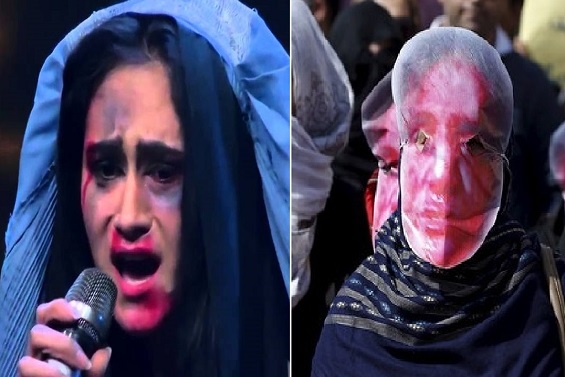A Rain of Stones
Sahar Aryan and Afghan Star

Olga M. Davidson
Afghan Star is a television talent show for aspiring singers and musicians, much like American Idol or British Pop. It was launched on Tolo TV in 2005. It has millions of viewers, owing its popularity to a sense of relief experienced after years of cultural repression and banning of music under the Taliban regime. Contestants, should they reach the top five out of a pool of about two thousand, are likely to get a recording contract, and the winner also gets a financial award. Needless to say, Afghani clerics today object to it, calling it un-Islamic and shameful. So, contestants may run a risk in performing, especially female contestants.
2016 is Season 11, and Sahar Aryan made it to the top seven before she was eliminated. The lyrics of her song are taken from a contemporary poem composed by Abdul Samay Hamed from Mazar al-Sharif. He is a trained physician, as well as an award-winning journalist, satirist, and poet. He posted his poem on his Facebook page on January 15, 2015.
Here is a YouTube video of the poem as set to song and performed by Sahar Aryan for Afghan Star:
And here is a transcription, followed by a rough translation:
شاعران تنها تنم را شاعرانه دیده اند
روح خود را گر برهنه کرده ام خندیده اند
مرد گیسو گفته گفته تار تارم میکند
سنگ سنگ سنگفرش, سنگسارم میکند
جاده می پیچد به پاهایم, شکارم میکند
دانه, دانه ,درد مانند انارم میکند
Poets have only seen my body idyllically,
Yet whenever I have stripped bare my soul, they have mocked me.
Men repeatedly have romanticized my tresses but then
They destroy my being, strand by strand, bit by bit.
Even the stones that lie along the stone-paved way rain upon me.
The path ensnares my feet, turning me into prey.
Bit by bit, seed by seed, the pain transforms me into a pomegranate.
Though they were composed by a man, the lyrics that Sahar Aryan chose to use for her song address the persistent abuse, violence, and dehumanization that Afghani women suffer at the hands of men. The poem was composed before the horrific murder of Farkhunda Malikzada by a mob of men on March 19, 2015, but its lines as sung by Sahar Aryan can be read as a subtle reference to that event; so too her subtle body movements. Her makeup simulates the face of a battered woman, and her reference to being transformed into a pomegranate evokes the haunting image of Farkhunda’s bloodied face and plaintive eyes. One only need do a search for Farkhunda Malikzada on Google to see this image, taken from a video of the murder. This image, which has pervaded the Internet, was used as a mask for mourners to wear at the funeral of Farkhunda. (I have written about this image previously here on Mizan.)
I highlight the use of the word tār in the song. This word normally means a ‘chord’ or the ‘string’ of a stringed intrument, but in the song it evokes a strand of hair, since tār is used here in combination with gīsū, a poetic word for ‘hair’ that I have translated as ‘tresses.’ Pictured here is a woman’s hair as it is pulled out strand by strand, evoking the dishevelled hair of Farkhunda at the moment of her destruction. The song speaks of stones raining down from above, evoking the image of Farkhunda as she is stoned to death. The word sangsār as used in the song actually means ‘stoning.’ So, the same word is a most fitting title for the whole song.
Other images too are relevant. The path ensnaring the feet and the hunted prey both bring to mind the sequence of horrific events that happened to Farkhunda before her body was finally run over by a truck and then set on fire. As for the singer’s body movements in the performance of her song, they are enhanced even by her style of dress. For the first part of the song, she sits in dim lighting, wearing a blue burka, thrown back so her face is exposed. We then see her standing tall in bright lighting. She has removed her burka but is wearing a scarf, with a looseness that suggests dishevelment. And now we see that her dress is torn. It is covered in red patches, evoking blood. And now she sings that she is turning into a pomegranate.
In this music video, her dress evokes the blue burka that was so prevalent under the Taliban, making a more universal statement.
The song matches in its power the message conveyed by the group of women who conducted the funeral of Farkhunda, seeking to make sure that her horrifying mob murder should not be forgotten.1
Sahar Aryan herself has spoken about it in similar terms. As quoted in Newsweek, she notes that “the hatred my family have for me because I sing” has been a central source of artistic inspiration for her. She continues: “Then I saw what happened to Farkhunda. I wanted to voice both my anger and the anger of all women in Afghanistan.”2
OLGA M. DAVIDSON is Research Fellow in the Institute for the Study of Muslim Societies and Civilizations at Boston University, Chair of the Board of ILEX Foundation, and member of the Advisory Board of Mizan. She is the author of Poet and Hero in the Persian Book of Kings (Cornell University Press, 1994; 2nd ed. Mazda Press, 2006; 3rd ed. ILEX, 2013) and Comparative Literature and Classical Persian Poetry (Mazda, 2000; 2nd ed. ILEX, 2013), as well as over two dozen articles and reviews.
[1] On the aftermath of the killing, see R. Nordland and J. Sukhanyar, “Afghan Court Confirms Reduced Sentences in Mob Killing of Farkhunda,” New York Times, March 8, 2016 (http://www.nytimes.com/2016/03/09/world/asia/afghanistan-farkhunda.html).
[2] D. Moylan, “Afghan Idol Throws Off Her Burka and Belts Out Domestic Violence Protest Song,” Newsweek, February 22, 2016 (http://www.newsweek.com/afghan-star-sahar-arian-belts-domestic-violence-protest-429090?rx=us).


